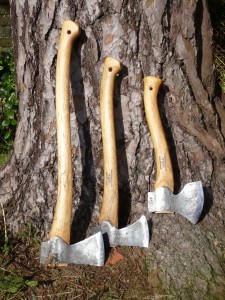Bushcraft by Nick Gallop

What do you think when you see this picture to the left?
I had the axe on the left of the picture (a Gränsfors Bruks Scandinavian Forest Axe, a great axe!) delivered to my office a few years ago. It was to be used in the bush for wood craft and preparing firewood – just pretty regular axe stuff. Only one guy in the office recognised it as a tool, everyone else regarded it as a weapon. This has stayed with me ever since as something very sad. Thousands of years of human craftsmanship forgotten. Not many years ago most people would have contact with cutting tools in their work or at home to chop firewood but in a very short time we’ve moved to a place where people regard them with suspicion as they’re outside their experience.
We naturally distrust things which don’t fit our idea of what is “normal”. The cycle goes something like this: We don’t use this thing therefore we don’t understand it. We don’t really understand why anyone else would want one – it looks pretty dangerous. We’re scared by it. On the rare occasions these tools are used for violence this confirms everything we thought was not “normal” about them. They’re probably even more dangerous than we imagined. We are more scared than before. It would be better for everyone if they were banned.
Of course this same cycle leads us to hold ideas about a whole range of things, things we don’t really understand, things different from what we do. Humans have the benefit of thought and reasoning but most of these ideas haven’t had much of either! They spring from an instinctive reaction. Unfortunately much as our instinct is to ignore, change or banish these differences this will never work. The only way forward is through education, understanding and tolerance towards others ideas, beliefs and customs.
I believe anyone involved in an expedition has an incredible opportunity. An opportunity to promote education and understanding and play a part, however small, in smoothing out the differences which so often cause friction in the world. Only by bridging the gap between people with real or imagined differences can both realise that they are basically the same.
I think this is much easier if you strip away some of the layers of technology which insulate us from the world. A great way to do this is to take a step back from the 21st century and learn some primitive wilderness skills. For anyone not sure what I’m talking about, these are the kind of skills practiced by our ancestors, skills which allow us to work with nature rather than to tame it. To simplify your kit and to know you can forage for food and make all you need gives an incredible confidence.
As a society we have lost touch with the earth and with these skills that have been used for the greater part of human existence. I truly believe this connection is more important than we realise. By learning how to work with natural materials you can reforge the link to nature and just as importantly to the people in the world who still use these traditional skills in their every day life. What an amazing thing – to share understanding, share skills and break stereotypes.
Being able to navigate and travel confidently are important but learning to improvise and repair kit using natural materials, to make fire without matches or a lighter, to find food, water and shelter will take your confidence to a whole new level. This confidence allows you to become less reliant on modern clothing, kit and gadgetry and peel away another layer of difference between you and the majority of people in the world who can’t afford this clothing, kit and gadgetry!
Whatever you do, whether in expeditions or in everyday life, make connections with people and with the earth. Understand differences and educate others. On a personal level you’ll never regret it and you never know, it might just make the world a better place.
Visit Nicks homepage and blog at http://skillsforwildlives.typepad.com/